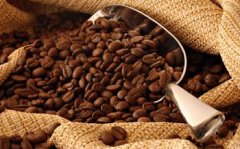Easy to understand how to preserve raw coffee beans (7)

Drinking coffee is fresh, and if the coffee beans are not properly preserved, it will accelerate the aroma loss of coffee beans, thus affecting the taste of coffee, so the preservation of coffee beans is a key point. I will share with you: coffee bean preservation method.
Roasted coffee beans are easily oxidized by oxygen in the air, causing the oil contained to deteriorate, the aroma to volatilize and disappear, and then accelerated by temperature, humidity, sunlight, etc.
Therefore, the preservation method of coffee beans is usually closed, low temperature and protected from light.
Coffee beans are usually stored in a sealed container.
Some friends will ask whether coffee beans can be stored in the refrigerator, the suggestion is that if unopened coffee beans can be placed in the refrigerator, the temperature will decrease, and the oxidation rate of coffee beans will slow down.
However, if the coffee beans have been opened, it is not recommended to put them in the refrigerator. Among the important elements affecting coffee, humidity is the most important to the taste of coffee. Coffee beans will absorb moisture and the taste will deteriorate to a great extent.
After opening, the coffee beans are stored in a special sealed can or a special sealing strip (clip). After sealing, they can be stored in a cool and dry place.
1)principle
Unprocessed raw beans after harvest and cooked beans after baking, because the principle and object of bean degradation are different, the natural preservation method is different.
The key point of cooked bean protection is to resist the acidification phenomenon of oil in roasted beans, while the key point of raw beans is moisture! Like all other unprocessed plant varieties, it contains moisture that has a major impact on the appearance, taste, physical properties, and conditioning methods of the plant.
Moisture in food raw materials affects the growth, physicochemical changes and oxidation reactions of microorganisms, which is an important reason for food deterioration.
At the same time, the amount of moisture has a great impact on how coffee is roasted in the future and the taste after roasting. In plants and biology, the moisture content of coffee beans is refined into "bound water" and "free water". The free water that can boil has an absolute influence on the method and taste of roasting coffee, but it is too professional and scientific.
2)method
The information of coffee shops and large manufacturers who have seen their own roasted beans shows that the key to the preservation of coffee beans is to avoid excessive protection.
Basically put in a cool and ventilated place to avoid sunlight at room temperature can be stored! If it is long-term storage, in order to prevent moisture, beans can be placed in a well-ventilated bag on a high place or hanging storage.
Some beans, such as Kona (Hawaii), which is suitable for immediate baking after picking (with the right moisture content), and some imported beans that have been preserved for some time in the region of origin and the region of first purchase (Europe, Japan, North America, etc.), should be sealed and stored in the refrigerator.
instant baked beans
Here, it is especially suggested to carefully treat the moisture and other quality conditions of "old beans" that have been preserved for a period of time in high humidity and high temperature areas such as South America or Indonesia, which are not conducive to the preservation of raw beans, and pay attention to the difference in preservation methods.
3)time
How long can raw beans last? There are different opinions. There are coffee shops that say three years old, five years old, and coffee shops that are said to offer coffee beans that are more than ten years old.
Long-preserved old beans, because most of the water loss, very easy to bake, taste also presents soft characteristics. Of course, such baked beans may also lose their own personality and aroma. The taste of fresh raw beans baked will have personality and aroma, but it is difficult to obtain a soft taste.
It can be seen that new beans and old beans have their own lengths, which can bring different enjoyment. The same beans will present different flavors due to different periods of preservation and baking. Preserving raw beans can obtain similar enjoyment of preserving red wine due to different years and obtaining no feeling.
There are four factors that affect the freshness of coffee beans: light, oxygen, temperature and humidity.
Therefore, all the methods mentioned below for the preservation of coffee beans are carried out around these four aspects.
I. It is not recommended to preserve it in the form of coffee powder
Many friends, especially those who have just started to contact the original coffee, buy coffee powder directly, most of which cannot be drunk at one time.
In fact, this coffee flavor damage is very fatal. Not to mention whether the coffee beans are freshly roasted, even if they are freshly baked and ground into powder.
Because its contact surface with the air greatly increased, oxidation is very fast, coffee freshness will be lost immediately, coffee original mellow flavor will gradually disappear.
Coffee's freshness will soon be lost.
Freshly baked coffee beans are ground into powder, and the flavor changes completely within two or three days.
So, if you don't just want to drink a caffeine-only beverage, but want to taste a good coffee that represents the true spirit of coffee, then it is recommended not to buy coffee powder directly, unless you consume it quickly in a day or two, otherwise, buy coffee beans and a grinder, and grind the beans before brewing.
Second, it is not recommended to store in the refrigerator
Although the low temperature in the refrigerator can slow down the natural deterioration of coffee, it is a good storage place, but the air in the refrigerator is cold and dry, easy to evaporate the moisture in the beans, so that the flavor is lost; plus the smell in the refrigerator is too much.
Therefore, it is better to use vacuum cans to preserve coffee beans. Therefore, under normal circumstances, it is recommended to store at room temperature (room temperature) and not to put it in the refrigerator.
Third, it is best to store at room temperature
Microorganisms and oxidation proceed at a moderate rate at room temperature, and freshly roasted coffee beans can be kept for two weeks at room temperature.
The change in coffee taste over the past two weeks is quite interesting. On the first day of baking, it's not very ripe yet, and you'll smell grass. The coffee beans are not sweet enough, and you will feel that it tastes like "stuffy".
Over the next few days, the grassy smell will slowly decrease, while the sweet smell will slowly increase.
The sweet aroma peaked around the third day and then slowly faded. Overall, the coffee bean's personality will be obvious and active in the first few days, and after about a week, its personality will become docile.
The sweet aroma peaked around the third day.
Some people insist on tasting coffee the first few days, while others like to taste the soft side of coffee beans after a week at room temperature.
If your coffee beans can be consumed within two weeks of roasting, it is recommended to keep them at room temperature so that the same bag of beans can experience a variety of changes.
Feel its changes every day, not only add some color to life, but also increase the experience of coffee bean freshness judgment ability is very helpful.
4. Method of preserving coffee beans at room temperature
Coffee beans are stored at room temperature and need to avoid strong light to the greatest extent, reduce contact with oxygen, and avoid high temperature and humidity.
Stir-fry the raw coffee beans; If you don't have a blender or a juicer, you can use heavy, hard things to crush the fried coffee beans, the more crushed the better; Put the coffee powder into the water and boil for about a quarter of an hour. Turn off the fire and wait for a while. After the powder precipitates, pour out the water and drink it. If there is gauze, you can filter it with gauze. However, after filtering with gauze, you still have to precipitate for a while and pour out the water to drink. Because gauze cannot completely filter out the powder residue. If the powder residue is drunk in your mouth, it feels very uncomfortable.
Drink it with sugar and milk according to your taste.
Choose your favorite coffee recipe.
Don't care what others say, as long as you use it well, cook it conveniently, drink happily, for you, it is the most suitable coffee brewing method. Some people prefer to brew coffee in convenient and fast American coffee pots, some prefer to enjoy the romantic elegance of corkscrew (siphon) coffee, others prefer the simplicity and purity of French pressure, the Italian style of mocha pot, or the flavor of hand brewed follicular coffee... In any case, the brewing method suitable for others may not be the best for you, and choosing the most suitable and favorite coffee brewing method is the first condition for enjoying DIY coffee brewing fun.
Choose your favorite and most suitable coffee brewing method
2. Buy only "freshly roasted" coffee beans with "marked roasting date"
"Coffee beans are fresh food" is already a very popular concept abroad. Fresh roast is the life of a good cup of coffee! Freshly roasted coffee beans retain the most fragrant and charming coffee flavor, and can easily brew a cup of the most fragrant coffee; the flavor of stale coffee beans has long been lost, and only a cup of bitter black water that is not fragrant enough and may even have changed its flavor. If you don't buy baked bread that was baked a month ago, please refuse to buy "stale" coffee beans/coffee grounds that are not clearly marked with a roasting date or that have been roasted for more than seven days.
Make coffee with "good water"
In a cup of coffee, more than 98% of the ingredients are "water." The importance of water is undeniable! If you use poorly-brewed coffee (e.g., dirty, smelly), even the best coffee beans are wasted effort--because poorly-brewed coffee can ruin the best coffee. Even a simple "filter kettle" can filter out many bad substances for "tap water", making the brewed coffee more fragrant, strong and mellow. As with making tea, avoid distilled water, and if tap water is of poor quality in your area, clean mountain spring water is ideal.
4. Put enough coffee
The amount of coffee beans used must be sufficient, using too little coffee powder may lead to bitterness or tastelessness, but do not put too much at once. The standard amount of coffee is: make a cup of coffee (about 180cc) with two tablespoons (about 15g) of coffee beans (powder). Adjust your coffee consumption accordingly.
Coffee beans must be used in sufficient quantities
5. Appropriate water temperature
Generally speaking, the most suitable water temperature for brewing coffee is between 88 and 94 degrees Celsius. Avoid using boiling water to brew coffee. Let the water boil for 1 to 2 minutes before brewing coffee.
6. Keep coffee equipment clean at all times
Don't bring the concept of "pot keeping" to coffee making equipment! After each use of coffee equipment, you need to wash immediately, put in a ventilated place to keep clean, dry, if the "pot" concept applied to coffee equipment, you will get a cup of coffee full of strange oily odor.
7. Cook coffee and drink it within ten minutes
Don't believe that your brewed coffee can be placed on the "electric hot plate" of the coffee pot to "keep warm" for most of the day! The longer the coffee is left, the flavor gradually dissipates and steals away. After the coffee is brewed, it is only a connoisseur who knows the way and enjoys it within ten minutes.
Important Notice :
前街咖啡 FrontStreet Coffee has moved to new addredd:
FrontStreet Coffee Address: 315,Donghua East Road,GuangZhou
Tel:020 38364473
- Prev

Understand the Health of Coffee beans easily (8)
1. Everyone knows that there is caffeine in coffee. It is well known that caffeine can stimulate nerves and muscles, invigorate the spirit and fight fatigue. In fact, coffee for the stomach, it can help digestion, help the decomposition of fat. This is why we often make a cup of Nestle black coffee in the afternoon in the office to help digest lunch. It can
- Next

Easy understanding of Coffee beans Coffee Bean cultivation (6)
Coffee is a perennial evergreen shrub or small tree of Rubiaceae. It is a horticultural perennial cash crop with the characteristics of fast growth, high yield, high value and wide market. Wild coffee trees can grow to a height of 5 to 10 meters, but coffee trees planted on the manor are often cut to a height of less than 2 meters in order to increase the amount of fruit and facilitate harvesting. The opposite leaves of coffee trees are long oval.
Related
- Guji coffee producing area of Guji, Ethiopia: Humbela, Shakiso, Wulaga
- What is the most expensive variety of Qiloso in BOP multi-variety group?
- How to store the coffee beans bought home?
- Why are Yemeni coffee beans so rare now?
- Ethiopian Sidamo all Red Fruit Sun Sun Santa Vini Coffee beans
- SOE is mostly sour? What does it mean? Is it a single bean? what's the difference between it and Italian blending?
- Is Italian coffee beans suitable for making hand-brewed coffee?
- How to choose coffee beans when making cold coffee? What kind of coffee beans are suitable for making cold coffee?
- Just entered the pit to make coffee, what kind of coffee beans should be chosen?
- Can only Japan buy real Blue Mountain Coffee? What are authentic Jamaican Blue Mountain coffee beans?

